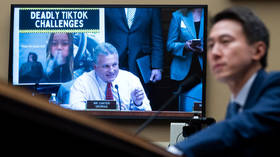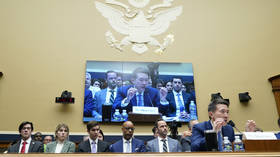US efforts to ban TikTok are pure projection by the world’s biggest spy power

As the United States contemplates a possible ban on TikTok, it relentlessly accuses Beijing of using the popular Chinese-owned social media application as a means of espionage, claiming that the Communist Party has access to user data.
Ironically, Washington itself is known to be doing exactly what US politicians are accusing China of doing. Using the unique advantage of having jurisdiction over the world’s top internet companies, the US has given itself the right to look into the private communications of foreign citizens anywhere in the world. Combine that data-sharing between intelligence agencies of the US and its allies, and you get the most comprehensive espionage regime in the world.
While American politicians and media constantly talk about fears of Chinese espionage, the near-absence of coverage of Washington’s own spying efforts ought to be a reminder of where the true power lies. When it comes to the shady activities of the CIA and the NSA, the public tends to only learn what they did years later from declassified documents, or what they “have been doing all along” from rare whistleblowers like Edward Snowden. All discussion and speculation about what they “may be doing right now” tends to be dismissed as conspiracy theories. Conversely, allegations of Chinese spying activities are constantly explained as “we all know they’re doing it” in the public eye, despite the lack of solid proof.
These warning signs remind us that the most cryptic source of all spying in the world is not China, but the US. Since the Second World War, the US has, in conjunction with Australia, Canada, New Zealand and the United Kingdom, maintained a worldwide spying regime known as the ‘Five Eyes’ which, in the age of mass communications, has been designed so that each government can bypass its own privacy laws and judicial restraints in order to spy on each other’s citizens, while supplying information within the group. In doing so, they have created a number of communication interception and surveillance programs, as revealed by Snowden, such as PRISM, ECHELON, XKEYSCORE, etc.
Of course, the US nearly holds a monopoly over the means of information and data gathering – definitely more so than any other country. This is because it has the privilege of having the world’s most dominant internet companies located on its own soil, such as Google, Microsoft, Twitter and Meta. These organizations are required by law to share data with the US government and authorities should they request it. But the US has also gone even further, as revealed by the Washington Post in 2020, the CIA had secretly acquired a Swiss cryptography company and used it to rig those machines to be able to spy on all who used them.
In pursuing its comprehensive spying regime, the US has been keeping an eye on friend and foe alike. This has included wiretapping the chancellor of Germany, coordinating with the intelligence services of other countries to undermine their commercial interests, such as Denmark and the Eurofighter program, and the list goes on.
And yet, American lawmakers suggest that you should truly be scared of TikTok, even as they prepare to reauthorize Section 702 of the Foreign Intelligence Surveillance Act (FISA), which allows US intelligence agencies to spy on foreign citizens’ phones and online communications without a warrant. Legalized in 2008, Section 702 needs to be reauthorized every few years lest it lapses under a sunset clause. Congress extended it in 2012 and again in 2018 and there’s little reason to believe it will fail to do so again before the next deadline, set for December this year.
The real problem Washington has with TikTok is not the alleged spying for Beijing’s benefit – it’s the fact that TikTok is the first global-spanning social media network of its magnitude that isn’t under US control – and thus, cannot be weaponized by the US for its own espionage. As such, it weakens the global surveillance regime built up by the US, which is, perhaps, the principal motivation behind Washington’s obsession with keeping control of “the future of the internet” out of Beijing’s hands. It’s more than a matter of spy games – it’s a matter of hegemony, and as such, it’s pure projection on Washington’s part to sound the alarm over TikTok’s alleged breaches of privacy.
As it stands, the US has an unrivaled digital spying network and is the greatest single threat to individual privacy online. If major internet companies are not owned or controlled by Washington or its closest allies, then the privacy of individuals around the world is increased, not decreased. The US has never been apologetic or open about how it monitors the communications of billions of people. Even if one has their suspicions about China, how can Washington’s claims about TikTok, and the motives behind the mounting pressure on the social media platform, be taken at face value?
The statements, views and opinions expressed in this column are solely those of the author and do not necessarily represent those of RT.















